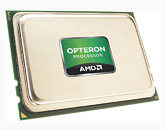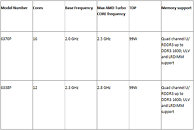Wednesday, January 22nd 2014

AMD Debuts New 12- and 16-Core Opteron 6300 Series Processors
AMD today announced the immediate availability of its new 12- and 16-core AMD Opteron 6300 Series server processors, code named "Warsaw." Designed for enterprise workloads, the new AMD Opteron 6300 Series processors feature the "Piledriver" core and are fully socket and software compatible with the existing AMD Opteron 6300 Series. The power efficiency and cost effectiveness of the new products are ideal for the AMD Open 3.0 Open Compute Platform - the industry's most cost effective Open Compute platform.
Driven by customers' requests, the new AMD Opteron 6338P (12 core) and 6370P (16 core) processors are optimized to handle the heavily virtualized workloads found in enterprise environments, including the more complex compute needs of data analysis, xSQL and traditional databases, at optimal performance per-watt, per-dollar."With the continued move to virtualized environments for more efficient server utilization, more and more workloads are limited by memory capacity and I/O bandwidth," said Suresh Gopalakrishnan, corporate vice president and general manager, Server Business Unit, AMD. "The Opteron 6338P and 6370P processors are server CPUs optimized to deliver improved performance per-watt for virtualized private cloud deployments with less power and at lower cost points."
The new AMD Opteron 6338P and 6370P processors are available today through Penguin and Avnet system integrators and have been qualified for servers from Sugon and Supermicro at a starting price of $377 and $598, respectively. More information can be found on AMD's website.
Driven by customers' requests, the new AMD Opteron 6338P (12 core) and 6370P (16 core) processors are optimized to handle the heavily virtualized workloads found in enterprise environments, including the more complex compute needs of data analysis, xSQL and traditional databases, at optimal performance per-watt, per-dollar."With the continued move to virtualized environments for more efficient server utilization, more and more workloads are limited by memory capacity and I/O bandwidth," said Suresh Gopalakrishnan, corporate vice president and general manager, Server Business Unit, AMD. "The Opteron 6338P and 6370P processors are server CPUs optimized to deliver improved performance per-watt for virtualized private cloud deployments with less power and at lower cost points."
The new AMD Opteron 6338P and 6370P processors are available today through Penguin and Avnet system integrators and have been qualified for servers from Sugon and Supermicro at a starting price of $377 and $598, respectively. More information can be found on AMD's website.


48 Comments on AMD Debuts New 12- and 16-Core Opteron 6300 Series Processors
I got curious and looked for what DP an apu can get. This is the only thing I can find on current a10 7850k but its from WCCFtech so who knows its validity. 5800k on left, 7850k on right. Overclocked.
But I say this is really good news for them, now they just need to make the 8core desktop parts more efficient
[Chart source]
It may bog down faster than AMD's SMT implementation but comparing Intel Xeon 6-core processors to AMD Opteron 6-core processors really doesn't show that to be the case either. Put bluntly, there's really no evidence to support AMD's SMT is any better than Intel's SMT.
I mean, if you make use of core 0 up to 100%, then core 1 should drop performance -quite- dramatically while core 2 wouldn't be affected at all.
I'm curious, how did you test the performance of your CPU between disabling/enabling hyper threading?
Edit: Here, I found it.
My test method was this custom application. Basically it does var++ for 1 second across how many threads you tell it to of what type of variable and it tells you what it reached, repeats it 10 times and gives you the total and the results for every thread. It shows basic compute power of any given processor.
Is it even possible to disable SMT on AMD processors? Repeating the test you did with an AMD processor would tell us definitively what sort of difference SMT makes on them.
Their results show that if you were running an FX 8 core as a quad core, it is better to disable one core per module rather than disabling two whole modules.
A The Xeon 2697 v2 pulls 130W not 95 so 2 will pull(260W) almost as much as 3 of these Opterons(297W)
B These Opterons in the news pull 99W not 151
C The Cinebench R11.5 chart shows performance with perfect HT scaling so if you're using the server for data management and tasks that use the same part of the CPU over and over again the Xeons will be 40% slower than what Cinebench shows
D The Xeon 2697 v2 cost 2100$ more than one of these new Opterons which is a difference so big that the Xeon won't close the price gap any time soon definitely not in a year or 2
E The Xeon 2660 cost 700$ more than the Opterons in the news and pulls 95W while being barely faster than the old Opterons which the new ones will either match or beat so again the price gap won't be closed in less than 2 years
Normal: 8 ALUs, 4 FPUs
Disable half modules: 4 ALUs, 4 FPUs
Disable two modules: 4 ALUs, 2 FPUs
I just wonder how much of a performance hit it takes in a generic benchmark between the first two senarios (half of the ALUs disabled). HTT loses about 30-35%. Looking at the URL, WinRAR is the closest to what Aquinus posted and 8 ALU/4 FPU scores about 47.6% higher than 4 ALU/4 FPU. That's slightly better than what Aquinus got but again, that's more of a memory benchmark than a compute power benchmark.
Edit: One of the users gave a range of: 33-59%. For HTT, it looks anywhere from 2-33%: semiaccurate.com/2012/04/25/does-disabling-hyper-threading-increase-performance/
Another article largely mirrors these results:
www.extremetech.com/computing/133121-maximized-performance-comparing-the-effects-of-hyper-threading-software-updates
I guess the morale of the story is that an AMD module struggles to keep up with an Intel core, HTT enabled or not. This is sad.
What is sad is how AMD doesn't have more low power CPUs. For example, Intel has a 8c/8t Atom now, it's an SoC, and has a 20-watt TDP. I don't mean to contradict you, but performance isn't what's sad about AMD CPUs lately. In all honesty, if AMD cpus were a bit lighter on the power we probably wouldn't care as much about single-threaded performance being lacking.